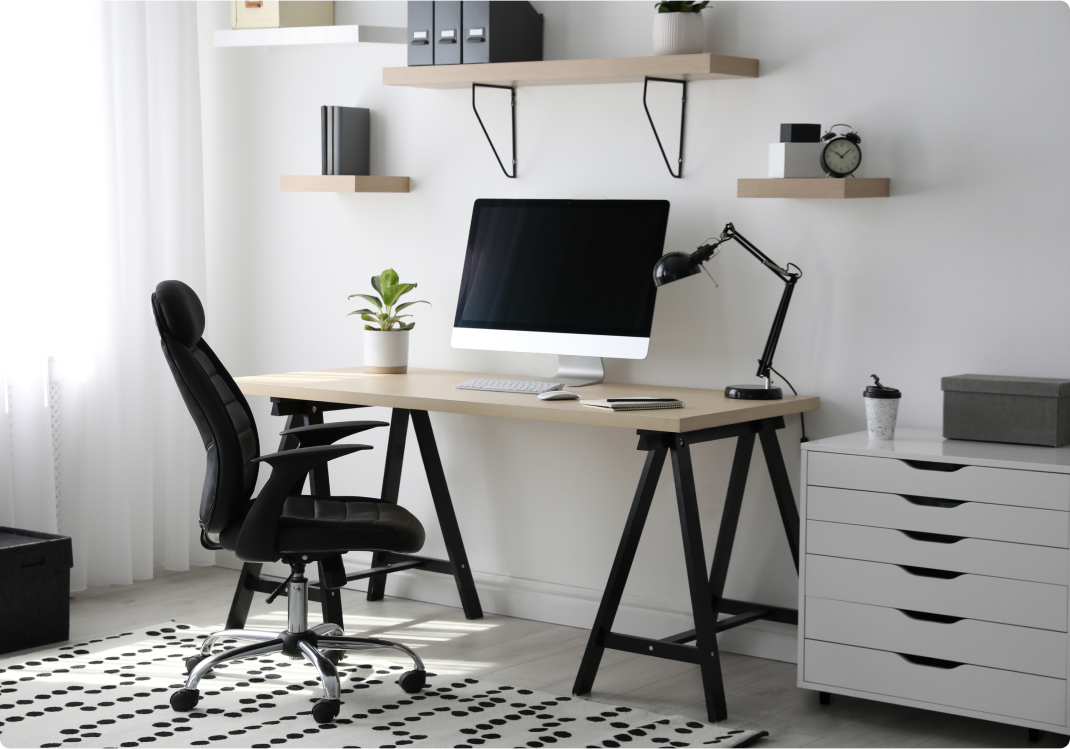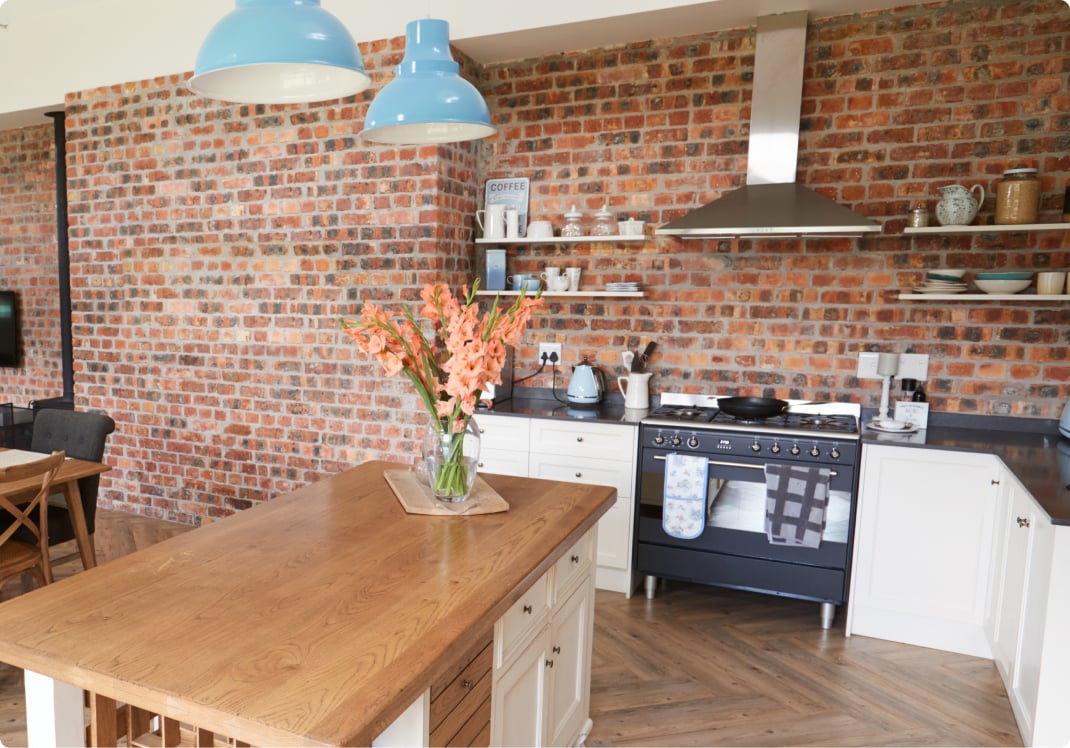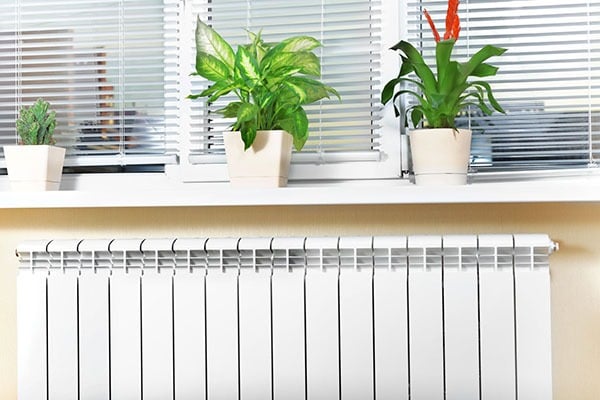Some of the most surprising stats:
- 14% of adults now work from home all the time, according to Pew Research Center.
- More than 20% of employees will work remotely by 2025, according to Upwork.
- Of employees who can work remotely, 35% do so all the time and 41% do so part-time, according to Pew Research Center.
With so many people deciding to WFH, well-planned home offices are critical. No more working from the couch or at the kitchen table.
Ideally, you have a spare room you can dedicate to your work, but if not, an attic, basement, or even a large closet can be converted into a perfectly suitable home office. And no matter where your workspace winds up, some of those most important considerations include:
- Space
- Ergonomics
- People
- Lighting
- Internet
- Power
6 Ways to Turn A Room Into An At-Home Office
If you’ve ever wondered, What is an ideal home office set up? We’ve got your answer. Check out our guidance:
1. Use as Much, or as Little, Space as You Have
Here’s how to use those extra spaces more efficiently:
- Your bedroom
- Spare bedroom
- Attic or basement
- Large closet
Your Bedroom
If you’re really pressed for space inside your home, turning a bedroom into an office is a quick solution, especially if you already have quick internet speed and ample lighting.
Some of our favorite recommendations if you’d like to transform your bedroom into an office:
- Make room for your workspace. Have a dedicated desk or nook where you can focus and be productive throughout the day.
- Keep it neat. YourYou’re bedroom’s pulling double duty now, and a messy room or desk can create unwelcomed distractions throughout the workday.
- Clean up at the end of the day. One of the biggest challenges of working inside your bedroom is mental: When you’re trying to sleep near your desk, you might become distracted while trying to fall asleep. Clean up at the end of the day to help you mentally finish up “at work” after each shift.
While much of this article focuses outside of the bedroom, keep reading for more turning-bedroom-into-an-office ideas.
Spare Bedroom
A spare bedroom is the best location for a home office — it’s out of the way, has a door you can close, should have several outlets, and probably has windows for natural light. It might even have a ceiling fan and a closet for extra storage.
If you’re using your spare bedroom as a guest bedroom, you don’t have to sacrifice that — your spare room can be a home office most of the time and a guest bedroom as needed.
Pro Tip: Here’s one of our favorite bedroom-converted-to-an-office ideas: If the room is small, install a Murphy bed and use a floating console desk, rather than a clunky piece of furniture.
If you need more ideas on how to convert a bedroom into a home office, pay attention to the rest of the tips in this article!
Attic or Basement
If you’re not ready to convert a bedroom to a home office, look elsewhere. An attic or basement can also work, particularly if you need a larger space for more than one person to work from home.
If your attic or basement has never gotten a remodel makeover, don’t worry. A few quick installations that can make your space feel cozy and productive:
- A lamp for better lighting.
- A fan for air circulation.
- A blanket or poster as a makeshift divider (until you can come in to build a real room).
Large Closets
You don’t need a whole spare bedroom or a spacious attic to create a private, dedicated home office space. Many large closets can accommodate slim-profile desks or floating desks, with floating shelves above for storage. When you’re done with work for the day, simply shut the door.
Check out our guide on how to create a winning home office in a small space to get even more out of your closet office.
2. Don’t Sacrifice Ergonomics
Don’t ignore ergonomics when working from home. Curling up on the couch with your laptop for eight hours a day could cause damage to your neck, spine, wrists, and other body parts.
When choosing a space for a home office, make sure you have room for two essential pieces of furniture:
- a properly sized desk. This will vary based on your height and personal preference, but most experts recommend one at least 29 inches tall.
- a comfortable, adjustable-height office chair, preferably one with casters, adjustable armrests, and an adjustable seat pan tilt. If you splurge on one item in your home office, it should be the chair — you’re going to be spending a lot of time in it, after all. A chair without the proper support could cause pain and repetitive stress injuries.
Of course, sitting all the time isn’t good for you, either. A standing desk is a good option, and they’re available at a range of price points. A desk that easily converts from sitting to standing offers the best of both worlds.
3. Consider Who Will Use Space — And How
Are you the only person who will work from home, or do you have a spouse who also needs a home office? You might choose a desk large enough to accommodate two people, although you’ll need a room with double the space — like an attic or finished basement, or even a garage.
Consider how much time you’ll spend in your home office, too. Do you work long hours? If so, you’ll want a larger desk and a more comfortable chair.





